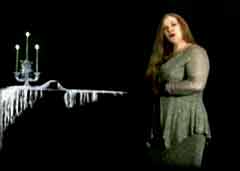|
"CHANSON D’AMOUR"
CD $14.97
|
|
|
|
|
|
|

|
I love everything French, I confess, and I will master the language. And now I have the extra pleasure of learning about love from this jewel of a CD. I understand about half of it, & it's enough to make me drop my paintbrush & book the next flight to my old haunts on the Glassblowers' street near Beaubourg.
Chanara has taken a century's selection of French love songs and sequenced them together, ending with Brel. Some are well-known, (a beautiful "Clair de Lune" by Saint-Saens) while others are rarely heard by the general public, ("Ici-bas" by Faure.") My personal favorite is "Psyche" by Paladilhe, a poetic vignette of 'adoration from a distance' that is new to my ears.
Chanara sings in a slightly husky, yet perfectly clear and pure voice, unaffected by operatic pretention. Her accompaniment is solely piano, effectively keeping pace with the emotion and rhythms of the songs. Robert Shultz, the pianist, understands that less is more, but he also knows how to counter the voice and drop little flowers of notes in the spaces.
Cabaret singing may heal your blues, but this goes beyond cabaret level. It's an example of the power of love songs to remind us that love is as near a soft voice in one of love's favorite languages: French.
Claude Palmer
I picked these songs for the sheer beauty of the music. After I translated them, I discovered they were all love songs. And when I began researching them, I found that all but one of them were composed within a 50-year time span, during the late 19th Century, in Paris, before World War I.
This was the era of great artists such as Van Gogh and the Impressionists Renoir, Manet, Monet, and Degas. France had been enjoying many years of political peace and stability. At this time, Parisian concert halls were primarily promoting German classical music. So the young French composers performed their music in the salons, the cafes, and at art exhibits. There was a deliberate trend to reject the serious grand manner of opera and embrace the warm ambience of the cabaret.
Chanara
|
|



